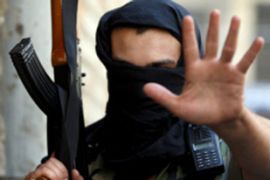Army moves to halt Lebanon fighting
Intervention follows second day of bloody clashes in northern city of Tripoli.

The violence has pitted Sunni supporters of the government majority against members of an Alawite sect loyal to the Hezbollah-led opposition.
Four people also died on Sunday in fighting in the same locality.
Bab al-Tebbaneh and al-Qobbe are mainly Sunni districts while residents of Jabal Mohsen are predominantly Alawite.
Jabal Mohsen is the base of the Alawite community’s Arab Democratic Party, a group allied to the opposition.
“We will use force if needed to end all armed presence in the combat zones where we are sending reinforcements following a unanimous accord between the warring sides calling for a ceasefire,” an army spokesman said.
Representatives from both sides had agreed to a ceasefire on Sunday but it proved short-lived.
Sectarian violence
Zeina Khodr, Al Jazeera’s correspondent in Tripoli, said the situation in Tripoli was very dangerous.
“It is very difficult to cross the frontline because of sniper fire … today the fighters have been using light- and medium-sized weapons. There is no sign that the violence is going to come to an end,” she said.
“People are saying that the clashes are taking a toll on their lives; they are unable to open their shops or go to work.”
Khodr said that there is historical animosity between the Alawites and the Sunnis in Bab al-Tebbaneh, but that the conflict today is purely political.
Political stalemate
The violence took place amid stalled efforts by Fouad Siniora, the prime minister, to form a new government of national unity following a deal last month to end a long-running crisis that had brought the country to the brink of civil war.
The deal, brokered in Doha, the capital of Qatar, led to the election of Michel Sleiman, the former army chief, as president.
The accord also called for the formation of a cabinet in which the opposition will have veto power over key decisions as well as a new electoral law.
“Ever since the Doha agreement was signed and the election of a new president, we have seen sporadic clashes in various areas of Lebanon,” Khodr said.
“Nobody knows whether this is an organised campaign by the political parties or whether it is localised friction between the groups, especially here in Tripoli.”